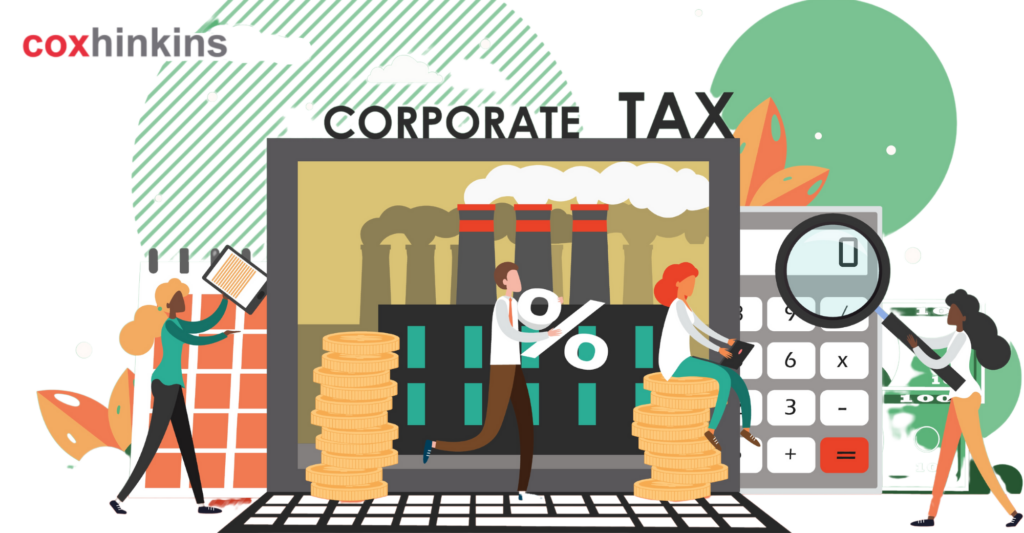Dealing with business taxes can frequently be likened to solving a challenging puzzle. Corporation Tax is one aspect of this problem that every business owner must comprehend. It’s an essential part of managing a successful business, not just another bureaucratic roadblock. In order to equip you as a knowledgeable business owner, let’s explore the world of corporation tax together and solve its challenges!
What is Corporation Tax and why does it matter?
A tax on any business profits is what is meant to be understood as corporation tax. These earnings are the result of successfully managing your company. The companies that fit into this category are:
- Corporations with limited liability
- International businesses operating a branch or office in the UK Community groups, co-ops, or any other unincorporated association
Business owners need to understand corporation tax because it affects their bottom line. Your company’s cash flow and profitability can be greatly impacted by the amount you pay, which can eventually affect your capacity to make investments in expansion prospects or pay out dividends to shareholders.
You can prevent fines and legal problems that could damage your company’s reputation by understanding how Corporation Tax operates and adhering to laws. In the business environment, adopting correctness and transparency in handling your tax responsibilities shows professionalism and integrity.
How is Corporation Tax Rate calculated?
Allowable expenses deducted from total income produces taxable earnings, which you must first compute to estimate your business tax due. Expenditures such as wages, rent, utilities, and others are specifically associated with operating your business. After calculating your taxable profits, you can compute your tax liability by applying the current corporation tax rate.
To guarantee a precise assessment of your corporation tax burden, it is imperative that you maintain reliable records of your financial activities throughout the year. By streamlining this procedure and maybe identifying extra credits or deductions that could lower your ultimate tax liability, working with a certified accountant or tax counsellor can also help.
Step1 Calculate sales and income: In order to determine how much you owe, you need to create a profit and loss account.
This should include the entire amount of sales revenue your company generates. Addition to any interest you may have received from things like a corporate savings account.
Let us consider a scenario where a small consulting firm makes £120,000 in sales and earns £100 in interest on funds kept in a business bank account.
Step 2 Calculate Overheads: other business expenses and overhead cost can be subtracted from your trading income to determine the profit your company.
Remember to deduct all expenditures and authorized deductions from the trading income so you don’t pay more than it is essential.
The only costs you are eligible to write off are those that HMRC defines as “wholly and exclusively” related to your business.
Any item you have purchased especially for your company and don’t utilise for personal use probably qualifies for a claim. Generally, expenses include accounting fees, other sales cost such as materials or postage.
Step 3 Capital allowances and depreciation: Capital allowances are costs incurred by your company when purchasing fixed assets like furniture, plant equipment, and computing technology that will be a part of your organization for a number of years. The asset’s worth will decrease with time.
For instance, your company might calculate that a £1,800 computer will lose £600 annually over the course of three years. The asset is worthless after the three years are up. Depreciation, on the other hand, must be brought back into the tax computation because it is not an acceptable expense.
The majority of capital asset purchases will be eligible for Investment Allowance tax relief for small business tax computations.
Step 4 Entertaining costs: Business lunches, athletic event outings, presents, and complimentary samples are examples of expenses related to entertaining clients and suppliers that are not tax deductible. You are also not eligible to claim VAT or tax relief on these expenses.
Step 5 Calculating corporation tax: Assuming £1,800 was spent on capital equipment (which depreciates at a rate of £600 per year for three years) and £1,000 on client entertainment, our example budget is £1,800.
The profit that is subject to tax is determined by adding back any depreciation and client entertainment expenses to the profit before accounts total and deducting any capital allowances.
Deducting Business Expenses from Corporation Tax
The essential tactic for controlling your corporation tax is to reduce your tax bill by writing off business expenses. The taxable amount can be decreased by deducting allowable expenses. Generally, business expenses are deductable from your taxable income that are necessary for operating your business. Costs including office rent, personnel pay, utilities, consumables, and marketing costs are included in this. To substantiate these deductions in the event of an audit, make sure you maintain thorough records and receipts.
It is not possible to deduct certain non-essential or personal costs from business expenses. Understanding the differences between what counts as an acceptable company expense and what doesn’t is crucial. Make sure you are optimising your deductions while being compliant by working with a competent accountant.
What are allowable expenses?
Allowable expenses include rent, wages, utilities and marketing.
Non-allowable expenses- The non-allowable expenses include personal or non-essential costs.
To allow all the above deductions company must maintain record and receipt’s. So, that they will be beneficial at the time of tax filing.
How Corporation Tax payment should be done?
There are a few crucial actions you must take in order to pay corporation tax. First, finish your Company Tax Return to find out how much tax you owe. Making your payment is the next step after obtaining this information.
You have several options for paying corporation tax, including direct debit and internet banking. The amount of tax owed as well as your Unique Taxpayer Reference (UTR) are required. It is noteworthy that HM Revenue and Customs (HMRC) must receive payments electronically by the deadline. Be at ease if you are unable to pay in full at once; HMRC permits companies to spread out their payments over an installment plan. But keep in mind that any unpaid balance may be subject to interest charges. It is also required to notify HMRC using the relevant form if your firm has discontinued trading or if there is no tax due for a specific accounting quarter.
Tips for Reducing your Corporation Tax Liability
Claim eligible business expenses: Evaluate your annual business expenses and submit all of them for tax deduction. You can deduct expenses for things like staff parties, insurance, travel, and clothes to lower your overall tax liability. To ensure that all qualifying charges are uncovered that have been used solely for company activity, you should think about engaging with an accountant or tax specialist. You may be surprised to learn about some of these costs.
Make Charitable Donations: The charity you select can demonstrate that it was established for public benefit and charitable reasons. A few instances of what qualifies as a charity objective are the advancement of amateur sports, education, or the prevention of poverty.
There is a UK registration for the charity.
You can donate cash, stocks, machinery, goods you own, real estate, land, staff secondments, or sponsorships.
Keep costs and revenue separate: It is easier to identify and prove qualifying, deductible business expenses when expenses are itemized and invoiced separately. You may also ensure that the VAT paid on those expenses is documented, making reimbursement easier. Keep your overhead costs and revenue separate so that your expenses are not counted in tax liability. It will reduce your taxable profit margin to some extent.
Make pension contributions: Contributions to pension plans made on your employees’ behalf may be a cost-effective method of lowering your corporation tax liability. These contributions can be subtracted from your profits before taxes and recognized as allowable business expenses.
How does CoxHinkins assist for Corporation Tax UK?
For managing your corporation tax in the UK, having the right expertise on your side can make a big impact. This is where CoxHinkins steps in to provide valuable assistance tailored to your business needs.
With our team of experienced tax professionals, CoxHinkins offers personalized solutions to help you navigate through the complexities of corporation tax. They stay up-to-date with the latest regulations and changes in tax laws so that you can focus on running your business without worrying about compliance issues.
Whether you need guidance on calculating your corporation tax liability, maximising deductions, or ensuring timely payments, CoxHinkins has got you covered. Our proactive approach aims to optimize your tax position while minimising any potential risks or penalties associated with non-compliance.
Conclusion
Maximise profits and improve finances by using strategies to lower your corporation tax liability and get expert help from CoxHinkins who focus on UK taxation legislation. You can also take benefit of our other services like VAT, Audit, Bookkeeping and Company Secretarial Services London. To safeguard the prosperity and financial stability of your business, take a proactive approach to handling your corporation tax responsibilities.
Disclaimer: Kindly note this blog provides general information and should not be considered financial advice. We recommend consulting a qualified financial advisor for personalised guidance. We are not responsible for any actions taken based on this content.



